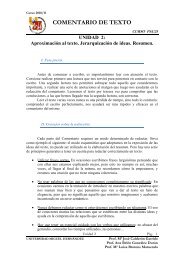unidad 10 la preposición, la conjunción y la interjección
unidad 10 la preposición, la conjunción y la interjección
unidad 10 la preposición, la conjunción y la interjección
Create successful ePaper yourself
Turn your PDF publications into a flip-book with our unique Google optimized e-Paper software.
INGLÉS INGL INGLÉS<br />
UNIDAD <strong>10</strong>:<br />
LA PREPOSICIÓN, PREPOSICI<br />
PREPOSICIÓN, N, LA<br />
CONJUNCIÓN CONJUNCI<br />
CONJUNCIÓN N Y LA<br />
INTERJECCIÓN.<br />
INTERJECCI<br />
INTERJECCIÓN. N.<br />
maria.carrillo@umh.es<br />
Prof. María Mar a José Jos Carrillo Martínez Mart nez<br />
ana.mol<strong>la</strong>@umh.es<br />
Prof. Ana María Mollá Mollá<br />
rverdu@umh.es<br />
Prof. Rosario Verdú Verd Durá<br />
Dur
LA PREPOSICIÓN, LA CONJUNCIÓN<br />
Y LA INTERJECCIÓN<br />
• Uso de <strong>la</strong>s preposiciones.<br />
• La <strong>conjunción</strong> y <strong>la</strong>s locuciones<br />
conjuntivas.<br />
• Las interjecciones y <strong>la</strong>s oraciones<br />
exc<strong>la</strong>mativas.
LA PREPOSICIÓN<br />
• Es <strong>la</strong> pa<strong>la</strong>bra que sirve para re<strong>la</strong>cionar al nombre<br />
con otras partes de <strong>la</strong> oración. En <strong>la</strong> mayoría de <strong>la</strong>s<br />
lenguas es <strong>la</strong> parte más difícil de sistematizar y en<br />
especial en inglés lo es por:<br />
- los varios significados de cada una de <strong>la</strong>s<br />
preposiciones<br />
in the box (lugar) / in January (tiempo)<br />
- por <strong>la</strong>s diferentes preposiciones que acompañan a<br />
nombres, adjetivos y verbos<br />
proud of / cruel to / think about<br />
- por los muchos verbos compuestos de <strong>preposición</strong><br />
look for / pick up / go on / get up
POSICIÓN DE LAS<br />
PREPOSICIONES.<br />
• De<strong>la</strong>nte de sustantivos.<br />
The box is on the shelf / We arrived at the station at 3<br />
o’clock<br />
• De<strong>la</strong>nte de pronombres.<br />
Stay with us / Wait for me<br />
• De<strong>la</strong>nte de gerundios.<br />
Don’t go to bed without checking the lights / She usually<br />
have breakfast after having a shower<br />
• Al final de algunas oraciones interrogativas.<br />
What do you cut the chicken with? / What are you listening<br />
to?<br />
• Al final de una oración de re<strong>la</strong>tivo cuando se omite el<br />
pronombre de re<strong>la</strong>tivo.<br />
That’s the person we came back with / Open the cupboard<br />
the cups are in
USO DE LAS PREPOSICIONES.<br />
• Para expresar tiempo:<br />
in (meses, años, partes del día, estaciones)<br />
on (días de <strong>la</strong> semana, fechas),<br />
at ( hora determinada del día, edad)<br />
in three days / in the morning / in 1999 / on<br />
Monday / on 25th December / at 2 o’clock / at<br />
night / at sixteen<br />
• Para expresar duración: from (desde), for<br />
(durante), until (hasta), during (durante), since<br />
(desde)<br />
I will be at the office from 9 a.m. / She has worked<br />
here since 2003 / We haven’t seen them for 2<br />
years (how long) / The bride fainted during the<br />
ceremony (+ sustantivo, = in)
USO DE LAS<br />
PREPOSICIONES II<br />
• Para expresar lugar: in / inside / outside / at / on<br />
/ between / among / near / in front of / opposite<br />
/ under / on top of / above / below …<br />
We live in Elche / We could meet them inside the<br />
theatre / The baker’s is at the end of the street<br />
/ It’s on top of the hill / I parked in front of the<br />
supermarket / We live opposite the cinema<br />
• Para expresar movimiento o dirección: to / at / up<br />
/ down / across / through / along / over / under<br />
Sen it to her / They didn’t arrive at the station in<br />
time / He’s going up/down the stairs / Don’t walk<br />
across the street. It’s dangerous / We went<br />
through a difficult situation <strong>la</strong>st year / They were<br />
running along the road / Let’s go under/over the<br />
bridge.
LA CONJUNCIÓN<br />
• Es <strong>la</strong> parte invariable de <strong>la</strong> oración que hace una<br />
función conectiva, ya que puede servir de nexo de<br />
oraciones y también de pa<strong>la</strong>bras o sintagmas.<br />
Happy and rich / He went but he left at once<br />
• No están en muchas ocasiones muy c<strong>la</strong>ros los<br />
límites entre <strong>preposición</strong>, adverbio y <strong>conjunción</strong>.<br />
I’ll go after you (<strong>preposición</strong>)<br />
He will come after (adverbio)<br />
After what you have said (<strong>conjunción</strong>)
CLASIFICACIÓN DE LAS<br />
CONJUNCIONES.<br />
• Se dividen en coordinantes y subordinantes.<br />
• COORDINANTES: and, or, but<br />
• SUBORDINANTES: because, if, though / although, in order<br />
to, how, where, when<br />
We were <strong>la</strong>te because it rained / (Al)though I don’t agree<br />
with him, I think he’s honest / When the war started, I was<br />
working in Leeds<br />
• Hay una serie de frases que seguidas de coma tienen<br />
carácter conectivo, se conocen como LOCUCIONES<br />
CONJUNTIVAS:<br />
On the contrary, I think…(por el contrario, creo)<br />
In spite of everything, she…(a pesar de todo, el<strong>la</strong>)<br />
On top of that, we…(encima de eso, nosotros)<br />
Just in case, it’s convenient… (por si acaso, conviene)<br />
However, they have been… (sin embargo, ellos han estado)
LAS INTERJECCIONES Y LAS<br />
ORACIONES EXCLAMATIVAS<br />
• La <strong>interjección</strong> consta de una o dos<br />
pa<strong>la</strong>bras y contiene <strong>la</strong> información<br />
semántica de una oración; por eso se <strong>la</strong><br />
considera como una oración comprimida.<br />
• Se distinguen dos tipos de interjecciones:<br />
1) <strong>la</strong>s pa<strong>la</strong>bras onomatopéyicas:<br />
Oh! / Smash! / Brrr! / Miaow! / Arf! Arf!<br />
2) <strong>la</strong>s pa<strong>la</strong>bras de contenido semántico:<br />
Heavens! / Goodness! / Oh, my dear! / For<br />
Heaven’s sake! / What a girl! / How well he<br />
p<strong>la</strong>ys tennis!



